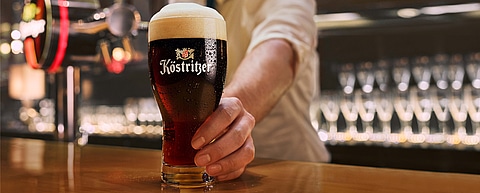History of Schwarzbier
Schwarzbier, or “black beer,” refers to a dark lager that originated in Germany. Although it is certainly not the first beer ever brewed, it is quite possibly the oldest continuously brewed beer style in the world. Historically, the term Schwarzbier was likely a generic name attributed to any dark German beer, making it difficult to accurately trace its origins and evolution.
A Bavarian Burial & A Bamberg Bishop
In 1935, archaeologists working on a Celtic tomb in Northern Bavaria found evidence of black beer dating back to around 800 BC. Among the artifacts found at the nearly 3000-year-old burial site was an amphora containing the remains of a black beer and bits of partially baked bread, a known fermentation starter for the time. The burial mound, located seven miles from Kulmbach, unearthed the oldest evidence of brewing found in Europe
In 1174, a charter letter from the Bishop of Bamberg refers to a Kulmbach brewery – a district where black beer is still brewed today. Despite the lengthy gap in time between these two events, it is highly likely that brewing culture persisted during the intervening years. The beer remnants from the amphora could possibly be an ancient ancestor of the modern schwarzbier.
Braunschweig, Thuringia & Northern Bavaria
Schwarzbier is first documented in 1390, with reference to a Braunschweig beer called Braunschweiger Mumme, or Brunswick Mum. Around the same time, Thuringia and Northern Bavaria were brewing beer similar to that of their Braunschweig neighbours. While it’s difficult to document its earliest development, the history of Thuringia’s Köstritzer brewery is the history of the modern schwarzbier.
Köstritzer Brewery
In 1543, the Counts of Reuß acquired a brewhouse in Bad Köstritz, initially known for its noble connection, it became well-regarded for its quality beer. Students at nearby University of Jena developed a taste for the Köstritzer brew, giving the brewery its first big taste of success. Due to increased customer demand, Köstritzer sold beer as far away as Berlin, during a time when most breweries were not permitted to sell outside their home region. In 1806, the counts of Reuß were given a royal promotion to princes, now marketing Köstritzer a “princely brewery.”
World War II, GDR & Reunification
Both 20th century wars and the emerging popularity of pilsners had a devastating impact on many local German beer styles. Köstritzer was fortunate to end up in Eastern Germany following World War II, where the East German government nationalized Köstritzer, effectively preserving the brand through the post-war era. Following German reunification in 1990, Köstritzer was purchased by one of Germany’s largest brewing conglomerates called Bitburger. The 1991 acquisition was incredibly fortunate for Köstritzer, as the once nationalized brewery was now entering a free market under German reunification.
Bitburger marketed Köstritzer schwarzbier as a regional specialty, launching it into the global marketplace. The style generated modest foreign interest, especially with the rise of American brewing and international interest in European beer styles beyond pale lagers. Köstritzer set the standard for schwarzbier, the brand becoming synonymous with the style.
Modern Schwarzbier
Modern schwarzbier is a medium-light to medium-bodied beer that will typically possess a moderately roasted malt presence, with bittersweet flavours of chocolate and coffee. Malt character may give flavours and/or aromas of toast, caramel, toffee and nuts. The flavour is generally dry but smooth, with mild hop bitterness for a clean, soft, roasted finish. Schwarzbier is a great all-season brew, perfect for any and every occasion.
(Leah is a Toronto based freelance writer as well as the Beer Boss and a server at C’est What)


